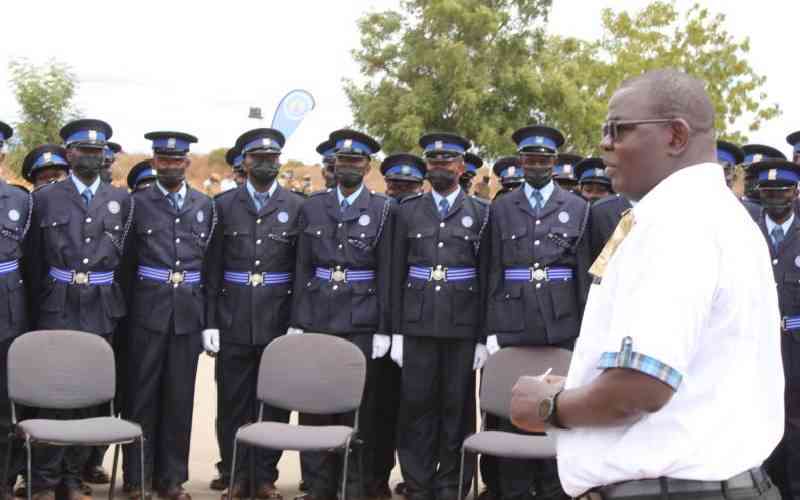Thursday was a defining moment for Uhuru Kenyatta's presidency as the ugly events witnessed in the National Assembly arguably marked the opening of a new chapter for the Jubilee Administration.
While the Opposition views the chaotic enactment of Security Laws (Amendment) Bill as re-activation of dictatorial rule, politicians allied to Jubilee regard the development as the first step for President Kenyatta to fully take charge of state and security affairs.
In a statement read by Coalition for Reforms and Democracy (CORD) co-principal, former Vice President Kalonzo Musyoka on Friday, the Opposition chiefs claimed the real target of the law was not terrorism but rather the reintroduction of a "police state and political hegemony for the enjoyment of the remnants of Kanu who are keen to reintroduce what Kenyans fought so hard to defeat".
However, according to National Assembly Majority Leader Aden Duale, the President had to act tough and decisively because of "the very serious and unique security challenge on our hands".
"Following the spate of terrorism-related attacks, Kenyans have repeatedly told him that the buck stops with him. He has accordingly assembled all tools at his disposal, including resources, personnel and relevant laws to deal with insecurity," says Duale.
With the International Criminal Court (ICC) burden off his shoulders, the President comes across as being more emboldened and assertive. Indeed, political pundits point out that the Thursday melodrama marks a turning point in Uhuru's presidency, as he gets more assertive and takes control of State affairs. It may well be a positive turn that would win him favour among the people and therefore entrench him at the helm of the country's political leadership or be a destructive turn that would ruin his reign and legacy.
Former presidents Daniel arap Moi and Mwai Kibaki walked the same path during their tenures in office, with different end results. Moi, who started off as an humble leader by following the footsteps (fuata nyayo, as he popularly referred to it) of his predecessor, Mzee Jomo Kenyatta, was jolted into firm action in 1982 following a coup attempt on his four-year old government. Moi suddenly started playing hardball and solidified his hold on power by turning Kanu into a powerful political machine.
Similarly, a rather laid-back Kibaki finally got his teeth in 2005 following his government's loss in the constitutional referendum poll. He immediately fired rebellious key allies in the Narc Government, including former Prime Minister Raila Odinga and Kalonzo Musyoka. Kibaki's hard stance and hold onto power would later turn tragic during the bloody post-election violence of 2007, in a poll where opinion remains divided over whether he actually won his second term in office.
Reflecting on Uhuru, National Assembly Deputy Minority Leader Jakoyo Midiwo, is not surprised by the turn of events. He says the President is a student of Kanu leadership, adding that it was only a matter of time before he returned the country to the "Kanu-style leadership".
"A retired politician from Central Kenya, who is a friend, told me sometime early this year that the day charges against Uhuru shall be dropped by the ICC, the country will see a totally different man in charge. This is already happening and we are asking Kenyans to brace themselves for tougher times ahead," said Midiwo.
According to ODM's National Chairman John Mbadi, the Thursday events have exposed the President as an intolerable leader with dictatorial tendencies: "Whether the amended laws are good or not, one just needs to re-look the process by which they were pushed through."
Claiming that the Speaker disregarded the House procedures in conducting the chaotic exercise, Mbadi wonders why the Bill was being forced down the throats of Kenyans.
"What was the hurry of pushing through this defective piece of legislation? If this is the path the new Kenyatta will follow to transact parliamentary business, then I fear for this country," says the Suba MP.
However, Duale utterly dismisses the notion that the President may be getting dictatorial. Uhuru, he maintains, has a social contract with the people of Kenya. Duale says the President has a serious transformational agenda for the people of Kenya. To achieve this, says Duale, he must first fix national security. "He is a serious, committed, practical, corruption-free president who wants to serve the people of Kenya regardless of their ethnic backgrounds," asserts Duale.
And he defends the President's action stating he acted according to the law, which allows him to initiate relevant Bills for enactment by Parliament. Duale says contrary to claims by Opposition that there was no sufficient time to consult on the Bill, there was a five-day public participation exercise during which members of the civil society as well as Commission on Implementation of the Constitution presented proposed amendments to the Bill.
Stay informed. Subscribe to our newsletter
"Thursday was not my toughest day, but rather the previous two days because I worked round the clock to bring together the relevant House committees overseeing the Bill (Legal, Defence, Security, Labour and Transport) as well as individual MPs and we struck a deal," says the Majority Leader in the National Assembly.
He singles out some of CORD's vocal MPs including TJ Kajwang', Millie Odhiambo, Peter Kaluma and Junet Mohammed, as among those who were part of this process. Duale says the rage and shock among Jubilee-allied MPs was why suddenly their Opposition counterparts opted to disregard and disown the amendments.
Runyenjes MP Cecil Mbarire regards the stand of CORD leaders as a desperate move to paint the President as a man who is unable to lead the nation and one who should therefore be kicked out of office before the end of his five-year term.
"They have been pushing this narrative in rallies across the country, having kicked off with calls for a referendum in the guise of 'Okoa Kenya' and lately the terrorism- related attacks appear to justify this narrative. From where I sit, Opposition leaders are simply unhappy that President Uhuru is trying to secure the country," opines Mbarire, who is also chairperson of Kenya Women Parliamentarians Association (KEWOPA).
Midiwo, however, claims the President has suddenly become arrogant and intolerant. The Opposition parliamentary official cites the treatment of the Security Bill as a case in point.
"I really sympathised with my friend (Speaker of National Assembly, Justin) Muturi whom I saw acting like a coward chicken – very intimidated and trembling. I gather he had express instructions to ensure passage of the draconian Bill by whatever means," claims Midiwo.
But Duale defends the Speaker in the manner he steered the House through a chaotic exercise, that Kenyans are united in describing as shameful. He maintains that this was a special sitting with a special agenda which had to be concluded. "The Speaker himself called for this special sitting to deliberate on an urgent issue of national importance and there is no way he was going to suspend it, because that would open him up to ridicule," says Duale.
While regretting the ugly events of Thursday, Mbarire confesses that Jubilee-allied MPs were forced to play dirty to stop their CORD colleagues from carrying the day: "They were determined to stop Parliamentary proceedings by all means and this is what hardened our position as Jubilee because (if they succeeded) we would never again have been able to have our way in the House."
Going forward, Midiwo is a very concerned man: "Even before the Bill was dispensed with and even before it was signed into law, the police were already brutalising MPs, including Senators. We are in a police state and Kenyans must stay alert."
 The Standard Group Plc is a
multi-media organization with investments in media platforms spanning newspaper
print operations, television, radio broadcasting, digital and online services. The
Standard Group is recognized as a leading multi-media house in Kenya with a key
influence in matters of national and international interest.
The Standard Group Plc is a
multi-media organization with investments in media platforms spanning newspaper
print operations, television, radio broadcasting, digital and online services. The
Standard Group is recognized as a leading multi-media house in Kenya with a key
influence in matters of national and international interest.
 The Standard Group Plc is a
multi-media organization with investments in media platforms spanning newspaper
print operations, television, radio broadcasting, digital and online services. The
Standard Group is recognized as a leading multi-media house in Kenya with a key
influence in matters of national and international interest.
The Standard Group Plc is a
multi-media organization with investments in media platforms spanning newspaper
print operations, television, radio broadcasting, digital and online services. The
Standard Group is recognized as a leading multi-media house in Kenya with a key
influence in matters of national and international interest.








